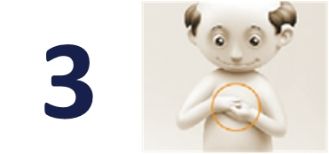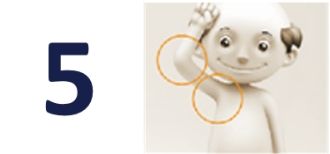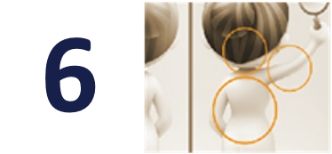2019 Campaña

Ju mund ta mundi ate por lufta ne rradhe te pare fillon duke e ditur qe jeni ne rrezik dhe cmund te beni per te.
Mos u mundni thjesht duke mohuar
Kanceri i lekures eshte forma me e shpeshte nder te gjithe semundjet kanceroze sot ne bote. Kanceri i lekures gjithashtu parandalohet dhe kurohet nese kapet heret. Por ekziston nje faktor i perbashket qe pengon njerezit te mbrojne veten e tyre nga kanceri i lekures dhe trajtimi ne kohen e duhur: mospranimi.
Kapercimi i mospranimit nenkuton mbrojtjen e rregullt nga dielli dhe diagnostikimi i hershem i simptomave te kancerit. Fleta e meposhtme do ju shpjegoje se cfare duhet te beni te kaperceni faktin e mospranimit dhe te mbroni veten tuaj.
Download, read and share.
We have prepared educational materials. You will find useful advices.
Feel free to download these documents and share them with your family, friends, colleagues...
People are traveling in your offices, lounges, corridors, health club, shops, waiting rooms?
Your job will take you to see, touch or take care of the skin of your clients? Do not miss out of danger.
Parandalimi i kancerit te lekures
Skin cancer is one of the world’s most common cancers. The good news is that it is usually treatable if detected early - and there are things we can do to prevent it.
Gjithmone ruhuni nga dielli
Evitoni ekspozimin e panevojshem.
Kerkoni hijen kur keni mundesi, dhe evitoni diellin e veres ne mes te dites.
Vishni rroba qe ju mbrojne
Perfshihen ngjyrrat e errta, kapele me strehe te gjere dhe me mbrojtje UV.
Per femijet kerkoni veshje ne te cilat eshte perfshire mbrojtja karshi rrezeve ultraviolet.
Perdor kremin mbrojtes
Sigurohuni qe kremi mbrojtes qe perdorni te jete si kunder rrezeve UVA dhe UVB. Mos harroni qe kremi mbrojtes ka efektin e tij gjysem ore pas aplikimit dhe efekti zgjat dy-tre ore.
Protect children
Femijet jane ne nje risk me te madh per te patur probleme shendetsore qe lidhen me ekspozimin ne diell. Loja ne ambientet e jashtme ka rendesi per to si femije por ju nuk duhet ti lini femijet te digjen ne diell.
Ekzaminoni lekuren tuaj per njolla qe:
-
Ndryshojne madhesine, ngjyren dhe/ose formen
-
Duken ndryshe nga njollat e tjera
-
Jane asimetrike ose kane kufinj te crregullt
-
Jane te ashper ne prekje (disa here mund te dyshosh per nje lezion duke e prekur edhe pa e vizituar ate)
-
Kane disa ngjyra
-
Kruhen
-
Jane duke u gjakosur apo lengezohen
-
Duken si lezione perle
-
Duken si plage lekure por qe nuk sherohen
Neqoftese shihni nje apo dy nga shenjat e mesiperme mos hezitoni. Kerkoni takim tek mjeku juaj.
Melanoma
This is the least common form of skin cancer, but also the most dangerous. It can affect people of any age, unlike other types that are more common among older people.
It presents as a spot that becomes darkly pigmented or develops irregular edges or different colours over time, or as a rapidly-growing pink or red lump. It can spread internally, so immediate treatment is required.
Basal cell carcinoma
This is the most common form of skin cancer, but also the least dangerous. It typically presents as an elevated skin-coloured lump with a shiny, pearl-like edge, a wound that does not heal, or a slightly crusty lump that grows slowly over time. If left untreated, it may ulcerate and invade deeper tissues.
Squamous cell carcinoma
This is the second most common form of skin cancer, occurring in areas of the skin that have had a lot of sun exposure, such as the face and scalp. It presents as a crusty lump which may grow quickly and become ulcerated and weepy. It can spread rapidly, especially if on the lips, ears, fingers and toes, or in immunosuppressed patients. Surgical treatment to remove the lesions is essential.
Actinic keratosis
This occurs most commonly in middle-aged and elderly people, on areas most exposed to the sun such as the face, neck, ears, back of the hands and scalp. It presents as red-brown scaly and rough patches of skin. The lesions are pre-cancerous; in 10– 15% of cases they may develop into squamous cell carcinomas, so they should be treated to prevent progression.
Because melanoma is particularly serious, you should be familiar with the signs to look for.
The ABCDE of melanoma can help you to detect it early:
A. Is the spot asymmetric?
B. Does it have uneven borders?
C. Does it contain different colours?
D. Is it larger than 6mm in diameter?
E. Is there an evolution in growth?
Check your skin once a month for any changes or suspicious-looking spots.
Your check should cover your whole body, front and back, with particular emphasis on areas exposed to the sun.
Stand in front of a full-length mirror with a hand mirror for those hard-to-reach places.
1. Look at your face, including your nose, lips, mouth and on and behind your ears.

2. Check your scalp, using a comb to part your hair. If you do not have much hair, check your entire scalp very thoroughly.

3. Check the front and back of your hands and in between your fingers.

4. Then focus on your neck, chest and upper body. Women, be sure to check between and underneath your breasts.

5. Bend your elbow to check your upper arm and armpits.

6. Use your hand mirror to check the back of your neck and your back, top and bottom.

7. Check your buttocks and the back of your legs. Finish by checking the soles of your feet and in between your toes.

Kanceri i lekures mund te preke cdo moshe. Eshte me i shpeshte tek njerezit mbi moshen 50 vjec ose tek ato qe ekspozohen shume ne diell.
You are at higher risk if you:
- Have fair skin or are prone to sunburn
- Were sunburnt during childhood
- Have spent a lot of time in the sun (for work or leisure)
- Have periodical exposure periods (e.g. on holidays)
- Use sunbeds
- Have more than 50 moles
- Have a family history of skin cancer
- Are over the age of 50
- Have undergone an organ transplant
Whether you’re in a high-risk group or not, there are simple things you can do now to protect you and your family from skin cancer.
By protecting your skin, checking yourself regularly and knowing the signs, you can stop any suspicious skin lesions before they become something more serious.
Skin cancer can be treated, and early diagnosis makes the chances of a full recovery very high.
If you spot a suspicious lesion, it is vital that you have it checked by a doctor or preferably a dermatologist as soon as possible.
Where treatment is delayed, the condition worsens, and in some instances, can lead to disfigurement, complications and even death. Don’t let delay reduce your chances of a positive outcome.
The golden rules are:
- Don’t ignore it, hoping it will go away
- Don’t wait to see how it develops, or manage it yourself
- Don’t assume it’s nothing serious
- Don’t think it isn’t a priority to get it sorted
- And above all, don’t be afraid to see your doctor or dermatologist
Skin cancer is treatable if it’s caught early.
If you have a spot that looks suspicious, go and see your doctor.



















